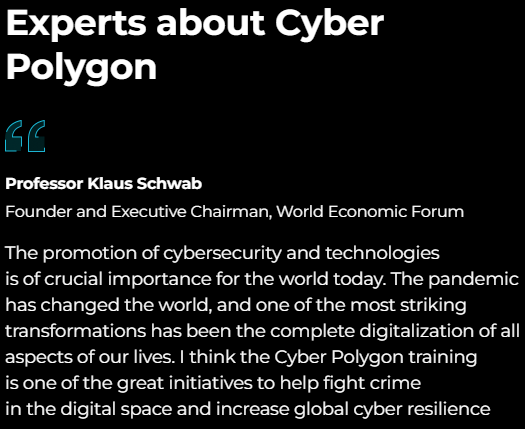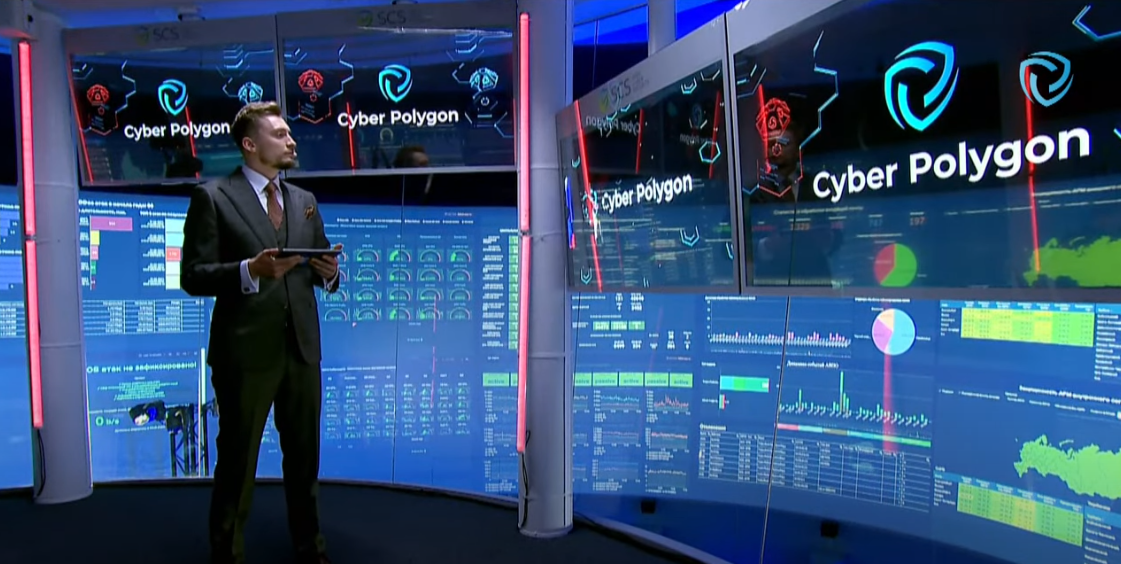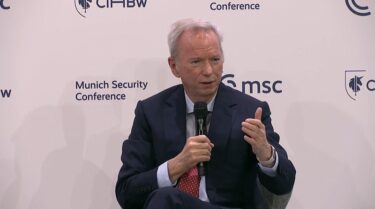The cyber pandemic preppers are back, this time in Riyadh where the WEF held its last meeting: perspective
The Cyber Polygon cybersecurity exercise is back for the first time since 2021 and will simulate a “sophisticated targeted attack on a tech company.”
Cyber Polygon 2024 will be conducted virtually on the BI.ZONE Cyber Polygon Platform from September 10-11.
Simultaneously, a Cyber Polygon booth will also be operating within the MENA Information Security Conference (ISC) in Riyadh, Saudi Arabia on the same dates.
“This year, the exercise is dedicated to a sophisticated targeted attack on a tech company. The plot centers on a startup that has developed a solution using AI technology. But the company suspects that the internal infrastructure has been compromised. The training participants have to investigate this incident”
Cyber Polygon 2024
According to the latest registration update published today, “Participation in the technical training is free. Participants only need to submit their corporate email, team name, organization they represent, industry, and country.”
While the latest update says that this year’s Cyber Polygon is “dedicated to a sophisticated targeted attack on a tech company,” the original re-launch announcement from April 23 says, “This year’s Cyber Polygon will be dedicated to the protection of industrial infrastructure. Corporate teams from all over the world will hone their skills in repelling a cyberattack.”
The April 23 re-launch announcement also adds:
“The training will run in conjunction with MENA ISC 2024 where we will host a Cyber Polygon booth. In parallel, BI.ZONE experts will take part in panel discussions and other activities. MENA ISC 2024 is one of the world’s leading cybersecurity conferences to be held in Saudi Arabia. The conference will bring together cybersecurity experts and vendors from different countries on one platform.”
From the Cyber Polygon booth, “visitors of the conference will be able to track the training progress on the scoreboard, try to solve some tasks right on the spot, and engage in a variety of activities.”
“We see the need to promote more training events and courses for specialists working with infrastructure defenses. Our training is aimed at strengthening blue team skills. In the 24 hours of the training, the participants will practice the actions of a response team while repelling a sophisticated attack and further investigate the incident using classical forensics and threat hunting techniques”
BI.ZONE CHIEF PRODUCT AND TECHNOLOGY OFFICER Muslim Medzhlumov, CYBER POLYGON 2024
In previous Cyber Polygon editions, the World Economic Forum (WEF) always played an intricate role as a strategic partner, with founder Klaus Schwab giving keynote addresses.
However, the WEF has scrubbed every mention of Cyber Polygon from its website except for two random instances here and here.
And the WEF is no longer listed as being involved with Cyber Polygon on the event’s landing page; instead it just says, “Cyber Polygon is hosted by BI.ZONE with the support of INTERPOL.”
Schwab and the WEF were mentioned in the April 23 re-launch announcement as having been previously involved, but the organizers then went on to erase Klaus Schwab’s name and that of the World Economic Forum from the list of previous participants in today’s registration update.
However, you can still find Schwab quoted at the bottom of the Cyber Polygon landing page, at least for now.

The last Cyber Polygon event was scheduled to take place on July 8, 2022 in Moscow, but it was postponed without any mention of war, conflict, or Ukraine.
Coincidentally, on that same date, July 8, 2022, Canadian telecoms giant Rogers experienced a major network outage that “disrupted nearly every aspect of daily life, cutting banking, transport and government access for millions, and hitting the country’s cashless payments system and Air Canada’s call center.”
Cyber Polygon 2022 was to be held under the theme of “digital resilience in the cloud age,” where participants would have focused their training “on the current trend of blurring perimeters and an active transition to the cloud” while “leading industry specialists will speak about cybersecurity trends, effective methods of preventing threats, and new defensive technologies.”
“The implication is clear: a lack of cybersecurity has become a clear and immediate danger to our society worldwide”
Klaus Schwab, Cyber Polygon 2021
Cyber Polygon 2021 simulated “a targeted supply chain attack on a corporate ecosystem in real time.”
In his opening remarks at Cyber Polygon 2021, WEF Founder Klaus Schwab warned, “A lack of cybersecurity has become a clear and immediate danger to our society worldwide.”
The unelected globalist went on to explain in July, 2021, “We need vaccines to immunize ourselves. The same is true for cyberattacks.
“Here, too, we have to move from simple protection to immunization. We need to build IT infrastructures that have digital antibodies built-in inherently to protect themselves.”
Discussions coming out of Cyber Polygon 2021 concluded with a desire to immunize the internet, demonize cryptocurrencies, and prop-up centralized systems of governance through a closer merger of corporations and states (public-private partnerships).
“We all know, but still pay insufficient attention to, the frightening scenario of a comprehensive cyber attack, which would bring a complete halt to the power supply, transportation, hospital services, our society as a whole”
Klaus Schwab, Cyber Polygon 2020
A year prior, at Cyber Polygon 2020, Schwab had warned of a coming cyber pandemic that would shock society to its core.
“We all know, but still pay insufficient attention to, the frightening scenario of a comprehensive cyber attack, which would bring a complete halt to the power supply, transportation, hospital services, our society as a whole,” said Schwab.
“The COVID-19 crisis would be seen in this respect as a small disturbance in comparison to a major cyber attack,” he added.
Cyber Polygon 2020 operated under the theme: “digital pandemic: how to prevent a crisis and to reinforce cybersecurity on all levels.”
“A cyber attack with COVID-like characteristics would spread faster and farther than any biological virus. Its reproductive rate would be around 10 times greater than what we’ve experienced with the coronavirus”
World Economic Forum, January 18, 2021
According to the WEF, COVID-19 was known as an anticipated risk, and so is its digital equivalent.
What’s more, “A cyber attack with COVID-like characteristics would spread faster and farther than any biological virus. Its reproductive rate would be around 10 times greater than what we’ve experienced with the coronavirus.”
A few months before the COVID-19 coronavirus outbreak, the WEF, along with the Johns Hopkins and the Bill and Melinda Gates Foundation, held a fake pandemic exercise on October 18, 2019 called Event 201, which specifically simulated a coronavirus pandemic to gauge global preparedness.
The WEF held its last meeting, the Special Meeting on Global Collaboration, Growth and Energy Development, in Riyadh, Saudi Arabia from April 27-29.
It is the same city where BI.ZONE will have its Cyber Polygon 2024 booth at the MENA ISC from September 10-11.
The Kingdom of Saudi Arabia is an absolute monarchy where all of its national officials are unelected, and the regime restricts almost all political rights and civil liberties.
Headquartered in Moscow, BI.ZONE has been a subsidiary of Sberbank of Russia since 2016, and it was established to “to detect cyber threats and intrusion attempts, as well as to carry out security system audits for the largest bank in Russia.”











